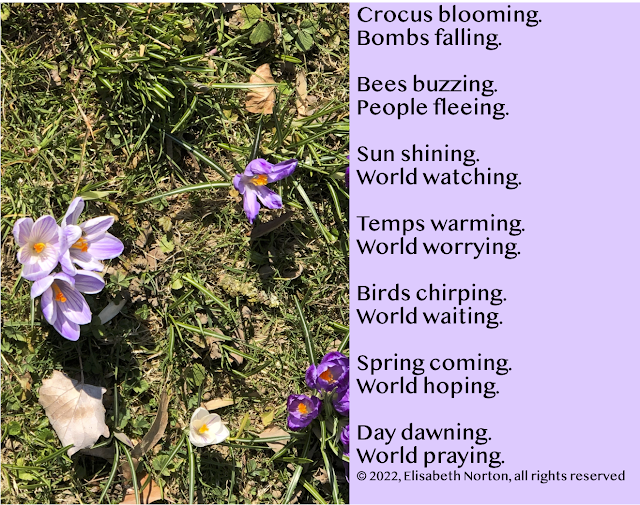This week my students will be taking a test that includes the present continuous verb form. We use the present continuous to talk about actions that have started, and are not yet finished. As I prepare my test for my students, I realize that I've been in a present continuous frame of mind all week.
On lunchtime walks, we see signs of spring; in the news, we read about fighting near Europe's largest nuclear plant and wonder if we should start carrying our iodine tablets* with us when we go out.
We are living in a present continuous state of cognitive dissonance.
*All residents of Switzerland living within a certain proximity of a nuclear plant are issued iodine tablets in case of an emergency. We never thought the emergency might come from fighting around a nuclear plant across the continent.
In my poem I'm grappling with the cognitive dissonance of such tragedy unfolding, and yet my own daily life and those of my family have (to this point) not been impacted by it. We work/go to school, meet deadlines, shop for groceries, and projects from the past are fully realized.
That was the case for me this week. Late last year I had the pleasure of talking with debut authors Meera Trehan (author of The View From the Very Best House In Town), and Alison G. Myers (author of A Bird Will Soar) about their books, both of which feature autistic protagonists. That interview was published this week on the Cynsations website. Since we spoke, A Bird Will Soar has received the Schneider Family Book Award at the ALA Youth Media Awards, and The View From the Very Best House In Town has been named a Junior Library Guild selection.
Both of these books do a wonderful job of depicting characters that autistic readers will identify with, and which can give neurotypical readers insights into the autistic experience. From found families and rescued eaglets (A Bird Will Soar) to a sentient house as a POV character (The View From the Very Best House In Town), there's so much to love and to enjoy in these books. You can find out more about the books, the authors, and their journeys to publication in the interview here.
Our Poetry Friday host today is Kat Apel. You can find the round up of this week's poetry goodness here.

Elisabeth, I have been late in responding to PF posts so I am glad to circle back and find your offering. You are so right that "we are living in a present continuous state of cognitive dissonance". Your poem beautifully shares that thought with the reader.
ReplyDelete